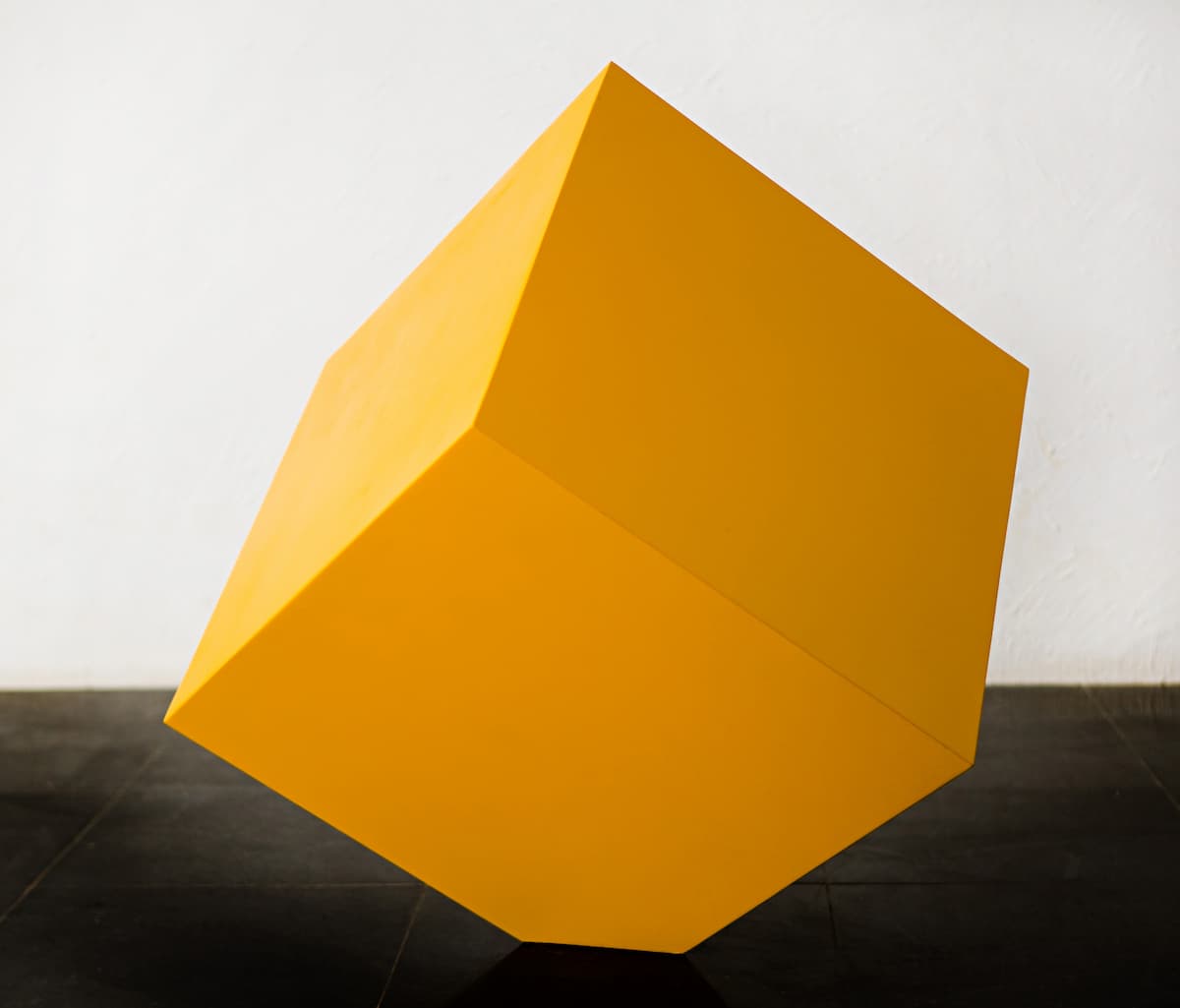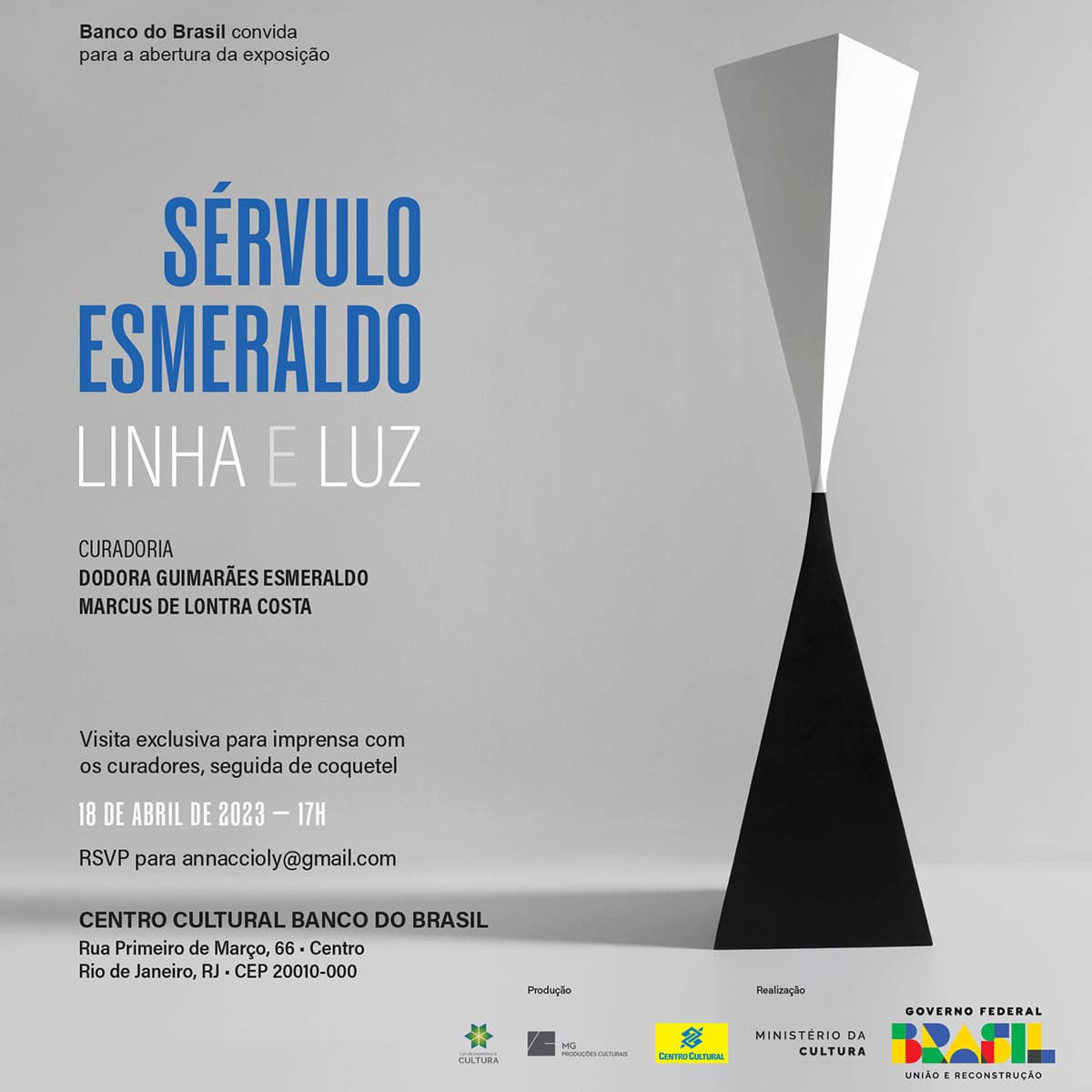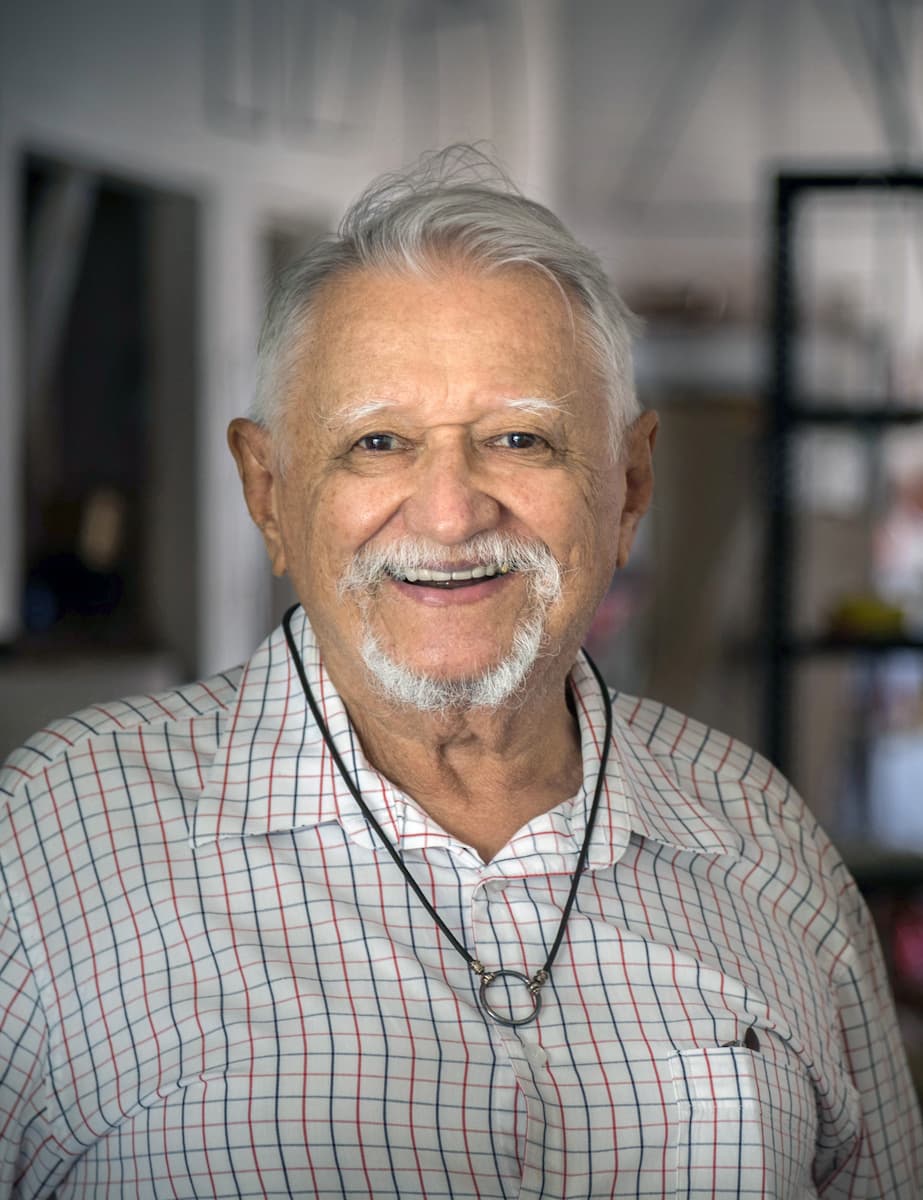“Sérvulo always creates elements full of enchantment, tangent with Op Art and surrealism, with the surprise, and always in the awareness that geometry is the essence of art”. Marcus Otter Costa
“Is there anything in nature more mysterious than light?? appears and disappears, breaks down and rebuilds. No wear and tear. And your speed never matches. thing of gods”. Sérvulo Esmeraldo
SÉRVULO ESMERALDO: LINE AND LIGHT
CCBB Rio de Janeiro 19 April
to 26 June 2023
The Centro Cultural Banco do Brazil Rio de Janeiro (CCBB-RJ) ambience, from 19 April to 26 June 2023,to exhibition SÉRVULO ESMERALDO: LINE AND LIGHT, the artist's first major retrospective after his death.
Obligatory reference in the history of Brazilian art, the artist from Ceará who died in 2017, at the age of 88 years, wins an exhibition that synthesizes his extensive production and presents 113 Works of different dimensions in different materials.
graphic power works, others with intense chromaticism, real or virtual moving objects, works that define the talent and intelligence of the artist who left a great legacy in the different languages where he traveled.
The exhibition ranges from small works by Sérvulo, of its early history, as a recorder, as a line and texture researcher, of the plane and the two-dimensionality, until its transposition into three-dimensional space. Thanks to the Sérvulo Esmeraldo Institute, based in Fortaleza, it was possible to bring to the public works that integrate an artistic heritage of extraordinary value.
The exhibition is sponsored by Banco do Brasil and, after Rio de Janeiro, goes to CCBB São Paulo.
Sérvulo Esmeraldo was born in the city of Crato, in Ceará Cariri, region full of culture and beauty in the middle of deep Brazil. Like most artists of his generation, started his work from the observation of the landscape.
Immediately, interested in the movement, through the transformation of natural phenomena, through the dynamics of bodies and the dialectic of knowledge.
"Still a child, Sérvulo began to produce small contraptions that appropriated the current of the abundant streams in the region.. In this quest between natural phenomena and human intervention, the artist brings art and science together, process and creation, objectivity and creative freedom. The perception of a certain visual equation discovered by observing the landscape is immediately answered by the transforming action of the artist”, says Marcus de Lontra Costa, who shares curatorship with Dodora Guimaraes Esmeraldo, widow of the artist and head of Instituto Sérvulo Esmeraldo.
Throughout your entire life, Sérvulo lived in Fortaleza, in São Paulo, in Rio de Janeiro, and then, for two decades, in Paris. In the mid- 1970, the artist returns to Fortaleza and his works incorporate the color and monumentality.
Servulus, traveler, never stopped being the curious boy from Crato. Therefore, his works distance themselves from constructive austerity and assert themselves as elements laden with beauty, restlessness and seduction.
“Unlike the austerity tradition of modernist constructivism, Sérvulo Esmeraldo creates poetry with his geometric action. His sculptures stem from a deep graphic sensitivity. That is why they are always drawings in spaces. They articulate, move around, they are kinetic objects sometimes, they are objects of transparency, objects of seduction and enchantment. Servulus creates happy geometry. A poetic and romantic geometry”, says Marcus de Lontra Costa.
“His graphic works determine the bases of the artist's praxis. She grants Servulus the ruler and the compass and, with these instruments, the artist subverts the plane in search of the dynamics of movement. Everything in Sérvulo is fluid, is becoming, it's liquid”, complements Otter.
The choice of works exhibited in SÉRVULO ESMERALDO: LINE AND LIGHT took into account the stages and interconnections of the works of the multiple artist and highlights the coherence and conciseness of his vast work. “This evolution has a simple and very clear logic: the wood engraving (1957) is the “matrix” for acrylic sculptures (years 1970) and, on the other hand, generated the lithographs (1976), and so on, as if obeying a project of sequences and consequences in a flow without gaps”, declares Dodora Guimarães Esmeraldo.
“Joy is also one of the constituent elements of the collection gathered in this exhibition.. Precisely because it is one of Sérvulo Esmeraldo's brands, who always put humor ahead of everything. a master, including, in the art of knowing how to live”, finishes Dodora.
Of course SÉRVULO ESMERALDO: LINE AND LIGHT contributes to fill a gap in national art and leads the new generation to greater knowledge about the work of this important artist, who did a lot for the dissemination of Northeastern art and for the artistic renewal of his State.
After Rio de Janeiro, the exhibition moves to the CCBB São Paulo, in season from 29 august to 20 th November of 2023.
Sérvulo Esmeraldo
Born in Crato, Ceará in 1929. Sculptor, engraver and draftsman, Sérvulo Esmeraldo began his professional career in Fortaleza, in the late 1940, in SCAP's free workshops- Cearense Society of Plastic Arts.
In 1951 sets up residence in São Paulo to study architecture and is attracted by the effervescence of the 1st. Arts Biennial and its artistic-cultural revolution. Temporary work at EBE – Empresa Brasileira de Engenharia increased his interest in mathematics, by physics, by the exact sciences. Learning that expanded to application in your craft as an artist-inventor.
Illustrator at Correio Paulistano, between 1953 and 1957, developed in parallel, vigorously, woodcuts of geometric nature. His exhibition held at MAM (SP), in 1957, accredited him for a year of studies in Paris, with a grant from the French government. Season that resulted in a stay of more than twenty years and in the development of a plural work of many aspects.
In Paris, attended the Lithogravure ateliers of the École Nationale des Beaux-Arts and the Metal Engraving of Johnny Friedlaender, devoting himself largely to the latter, having even made engravings from gouaches and paintings for Serge Poliakoff. The care taken in these works led Poliakoff to entrust him with, in 1965, running a dashboard 1,80 x 9,00 no Hotel Carlton, in Cannes.
Sign up to receive Event News
and the Universe of Arts first!
Owner of considerable engraved work, edited and distributed by leading European publishers, in the mid s 1960, decided not to be a full-time recorder anymore and started investing in his kinetic projects. Working on motor-powered objects, magnets and electromagnets, or manipulable, in acrylic or metal, went with the Excitables (static electricity work), his most original contribution to international kineticism.
The operation of these “machines” is linked to electrostatic charges produced by the observer’s friction on its surface.. The plexiglass sculptures, black and white, whose interest is the topology of the volume, also date from this same period.
In 1977 returns to Brazil, working on public art projects that included monumental sculptures in the urban landscape of Fortaleza, city where he set up atelier in 1979. His work is represented in the main museums in the country and in public and private collections in Brazil and abroad..
died in 2017, in Fortaleza, at the age of 88 years.
The Trustees
Dodora Guimaraes emerald Graduated in Social Communication, with a specialization in Theory of Communication and Image from the Federal University of Ceará. After a successful career in Advertising, founded and directed ARTE Galeria, first commercial institution dedicated to the dissemination and promotion of Contemporary Art in Fortaleza, in 1983. Curator of the Raimundo Cela Visual Arts Center and Sobrado Dr.. Jose Lourenco, from the Secretary of Culture of Ceará, between 1994 and 2015, has held and collaborated with important exhibitions in Brazil and abroad. is co-founder, curator and president of Instituto Sérvulo Esmeraldo.
Marcus Otter Costa was born in Rio de Janeiro and currently resides in São Paulo. In the 1970 worked with Oscar Niemeyer in Paris and, returning to Brazil he was editor of the magazine Modulo, edited by architect. He was an art critic for the newspapers O Globo, Press Tribune and Isto É Magazine. Directed the School of Visual Arts at Parque Lage, in Rio de Janeiro, where he held the historic show “How are you Generation 80”. He was curator of the Museum of Modern Art in Brasília and the Museum of Modern Art in Rio de Janeiro. Established and directed the Aloísio Magalhães Museum of Modern Art in Recife. Secretary of Culture and Tourism of the Municipality of Nova Iguaçu. Chief Curator of the CNI/SESI Marcantonio Vilaça Award. Implemented the Olímpia/SP Cultural Station. He has held several group and individual exhibitions in São Paulo., Rio de Janeiro, Belo Horizonte, Recife, Christmas and Fortaleza.
About CCBB RJ
Inaugurated in 12 October 1989, the Centro Cultural Banco do Brasil Rio de Janeiro represents the beginning of Banco do Brasil's investment in culture. CCBB RJ is housed in a historic building, designed by the architect of the Empire, Francisco Joaquim Bethencourt da Silva.
Landmark of the revitalization of the historic center of Rio de Janeiro, the Cultural Center maintains a plural program, regular and affordable, in the fields of visual arts, cinema, theater, dance, music and thought. The building has 3 theaters, 2 movie theaters, around 2 thousand square meters of exhibition spaces, auditoriums, multipurpose rooms and library with more than 200 thousand copies.
Visitors also have restaurants, coffee shops and shop, services with exclusive discounts for Banco do Brasil customers. The Banco do Brasil Rio de Janeiro Cultural Center is open from Monday to Saturday, das 9h às 21h, on Sunday, from 9:00 to 8:00 pm, and closes on tuesdays.
On Sundays, from 8 am to 9 am, the building and the exhibitions open during exclusive opening hours for people with intellectual and/or mental disabilities and their companions, according to legal determination (Lei Municipal nº 6.278/2017).
SÉRVULO ESMERALDO: LINE AND LIGHT
Exhibition: from 19 April to 26 June 2023
From Monday to Saturday, das 9h às 21h, on Sunday, from 9:00 to 8:00 pm, closed on Tuesdays.
Free entrance – Pick up your ticket at bb.com.br/cultura
Centro Cultural Banco do Brazil Rio de Janeiro (CCBB-RJ)
First Street March, 66 – 2nd walk
Center – Rio de Janeiro / RJ
Contact: (21) 3808-2020 | ccbbrio@bb.com.br
More information on bb.com.br/cultura
Follow CCBB RJ on social media:
twitter.com/ccbb_rj/ | facebook.com/ccbb.rj | Public entry is only allowed with proof of vaccination against COVID-19 and use of a mask.





